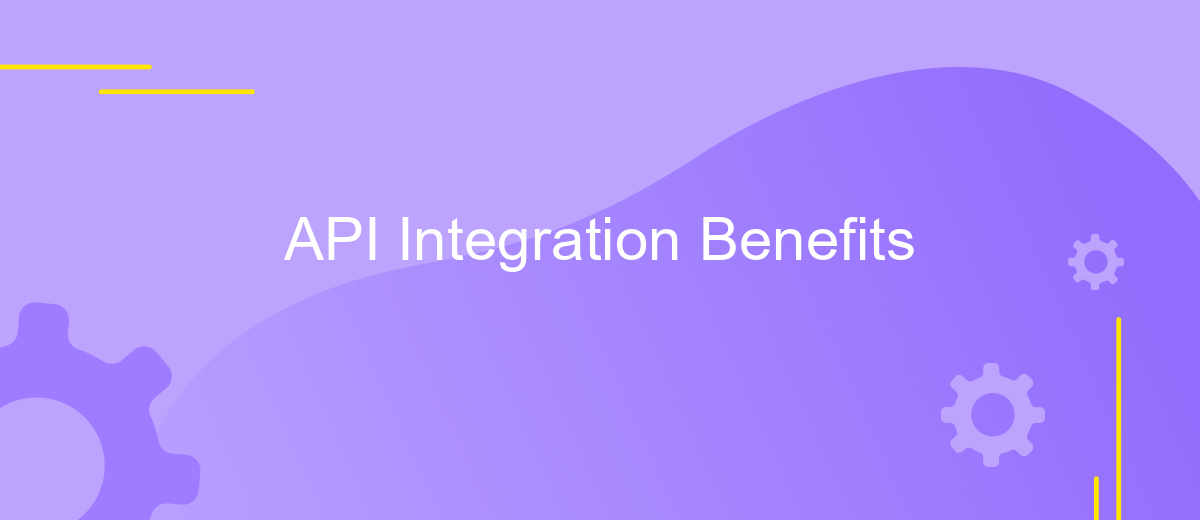API Integration Benefits
In today's fast-paced digital landscape, API integration has become a crucial component for businesses seeking to enhance operational efficiency and drive innovation. By enabling seamless communication between diverse software applications, APIs facilitate the automated exchange of data, streamline processes, and unlock new opportunities for growth. This article explores the myriad benefits of API integration, highlighting its role in transforming business operations and delivering a competitive edge.
Introduction: What is API Integration?
API integration is a crucial component in the modern digital landscape, enabling seamless communication between different software applications. By allowing disparate systems to exchange data and functionality, API integration enhances the efficiency and capabilities of businesses. It serves as a bridge that connects various platforms, facilitating a unified user experience and streamlined operations.
- Improved efficiency: APIs automate processes, reducing manual intervention and minimizing errors.
- Enhanced connectivity: They enable diverse applications to communicate and share data effortlessly.
- Scalability: APIs allow businesses to expand their services by integrating new functionalities easily.
- Cost-effectiveness: By leveraging existing systems, APIs reduce the need for developing new software from scratch.
As businesses continue to adopt digital solutions, the importance of API integration grows. It not only fosters innovation but also provides a competitive edge by enabling faster and more efficient service delivery. In essence, API integration is the backbone of digital transformation, driving growth and adaptability in an ever-evolving technological landscape.
Streamlined Data Exchange and Process Automation

In today's fast-paced digital landscape, streamlined data exchange is crucial for businesses aiming to enhance efficiency and drive growth. By integrating APIs, companies can facilitate seamless data flow between disparate systems, eliminating the need for manual data entry and reducing the risk of errors. This integration ensures that data is consistently updated and accessible across platforms, enabling informed decision-making and optimizing business operations. Tools like ApiX-Drive simplify this process, allowing businesses to connect various applications effortlessly, ensuring that data is synchronized in real-time without extensive technical expertise.
Moreover, process automation through API integration significantly enhances operational efficiency. By automating routine tasks, businesses can allocate resources more effectively, focusing on strategic initiatives rather than mundane operations. This automation not only saves time but also improves accuracy and consistency in business processes. With solutions like ApiX-Drive, companies can easily set up automated workflows, ensuring that their systems work harmoniously together. This leads to increased productivity and a more agile business environment, empowering organizations to respond swiftly to market changes and customer demands.
Enhanced Customer Experience and Business Growth

Integrating APIs into business systems can significantly enhance customer experience by providing seamless and personalized interactions. APIs enable businesses to access and utilize data from various platforms, allowing them to tailor services to individual customer needs. This personalization fosters a more engaging and satisfying customer journey, which can lead to increased customer loyalty and retention.
- APIs facilitate real-time communication, ensuring customers receive timely support and information.
- They allow for easy integration of third-party services, expanding the range of offerings available to customers.
- APIs enable businesses to gather and analyze customer data, helping to identify trends and improve services.
As businesses enhance their customer experience through API integration, they also unlock opportunities for growth. By improving service delivery and customer satisfaction, companies can attract new customers and expand their market reach. Furthermore, streamlined operations and data-driven insights contribute to more efficient business processes, ultimately boosting profitability and competitive advantage. In essence, API integration is a powerful tool for driving both customer satisfaction and business expansion.
Improved Collaboration and Communication

API integration significantly enhances collaboration and communication within organizations by enabling seamless data exchange between various software applications. This integration allows team members to access real-time information, breaking down silos and fostering a more cohesive work environment. By automating data sharing, APIs reduce the need for manual data entry, minimizing errors and ensuring that everyone is on the same page.
Furthermore, APIs facilitate better communication between departments by providing a unified platform for sharing information. This interconnectedness ensures that teams can collaborate more effectively, leading to improved decision-making and increased productivity. With APIs, organizations can streamline their workflows, allowing employees to focus on strategic tasks rather than administrative duties.
- Real-time data access improves decision-making processes.
- Automated data sharing reduces manual errors.
- Unified platforms enhance interdepartmental communication.
- Streamlined workflows boost overall productivity.
In conclusion, API integration is a powerful tool for improving collaboration and communication within organizations. By enabling seamless data flow and providing a unified platform, APIs help break down barriers between departments, fostering a more collaborative and efficient work environment. As a result, organizations can achieve better outcomes and maintain a competitive edge in today's fast-paced business landscape.
- Automate the work of an online store or landing
- Empower through integration
- Don't spend money on programmers and integrators
- Save time by automating routine tasks
Security and Scalability Considerations
When integrating APIs, security is paramount to protect sensitive data and maintain user trust. It is crucial to implement robust authentication mechanisms, such as OAuth 2.0, to ensure that only authorized users can access the API. Additionally, encrypting data in transit using protocols like HTTPS can prevent unauthorized access and data breaches. Regular security audits and vulnerability assessments should be conducted to identify and mitigate potential threats. Services like ApiX-Drive can help streamline these processes by providing secure integration solutions that comply with industry standards, ensuring that your API connections remain safe and reliable.
Scalability is another critical consideration when integrating APIs, especially as businesses grow and demand increases. A scalable API integration can handle increased loads without compromising performance. This can be achieved by adopting microservices architecture, which allows for independent scaling of different components. Additionally, leveraging cloud-based solutions can provide the flexibility needed to scale resources dynamically. ApiX-Drive offers scalable integration services that can adapt to your business needs, ensuring seamless performance even as your operations expand. By prioritizing both security and scalability, businesses can maximize the benefits of API integration while minimizing risks.
FAQ
What is API integration, and why is it important?
How does API integration benefit businesses?
What industries can benefit from API integration?
Can API integration improve customer experiences?
How can businesses start with API integration?
Do you want to achieve your goals in business, career and life faster and better? Do it with ApiX-Drive – a tool that will remove a significant part of the routine from workflows and free up additional time to achieve your goals. Test the capabilities of Apix-Drive for free – see for yourself the effectiveness of the tool.


